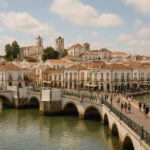Portugal has always been a land of kings, queens, poets, and explorers. From the royal palaces of Lisbon to the medieval fortresses that once defended the coastline, the country’s past is etched into stone, tile, and marble. Today, these architectural treasures are no longer just monuments to be admired from afar — many have been transformed into luxury retreats, where discerning travelers can sleep in chambers once reserved for nobility, dine in candlelit ballrooms, and wake to gardens designed for monarchs.
For the luxury traveler, staying in a Portuguese palace or pousada (the country’s network of historic hotels) is more than a night’s accommodation; it is a journey through history. Each property preserves centuries of heritage while offering the finest modern comforts — Michelin-starred cuisine, spa treatments inspired by tradition, and personalized service that makes every guest feel like aristocracy.
Unlike the grandeur of Versailles or the fortress hotels of Scotland, Portugal’s palaces and pousadas retain an intimacy that is distinctly Portuguese. Here, luxury is not ostentatious but gracious, rooted in authenticity and charm. Imagine sipping a glass of vintage Port under gilded ceilings, strolling through cloisters where monks once prayed, or watching the Atlantic waves from a rococo terrace once reserved for royalty. These are moments that linger long after the journey ends.
Portugal Magik Private Tours specializes in curating such experiences. Traveling in a private Mercedes-Benz with an English-speaking driver-guide, guests move seamlessly from palace to palace, weaving together stays in Lisbon, Sintra, Évora, Porto, and the Algarve. Each stop becomes a chapter in a story — a story of living like royalty, one night at a time.
As one recent guest from New York remarked after a palace stay in Sintra: “We felt as though we were part of history. Every corner of the hotel whispered stories of kings and queens, yet the service was so personal, so warm, that it felt like home — a very royal home.”
Let us take you on a journey through Portugal’s most extraordinary palaces and pousadas — the places where the past and present blend to create unforgettable luxury.
Lisbon & Sintra – Aristocratic Elegance
Lisbon, Portugal’s capital, is home to some of the most elegant palace hotels in the country. One of the most intimate is Palácio Belmonte (Pátio de Dom Fradique 14, website), a 15th-century palace perched above the Alfama district. With only 10 suites, each uniquely decorated with antique tiles and period furnishings, it feels less like a hotel and more like a private residence. Guests enjoy panoramic views of the Tagus River, private library salons, and curated cultural evenings — a favorite being private fado concerts within the palace walls.
Nearby, the Pestana Palace Lisbon (Rua Jau 54, website) offers a grander expression of aristocratic living. Once the residence of the Marquis of Valle Flor, this 19th-century palace is now a Leading Hotel of the World. Its opulent ballrooms, gilded mirrors, and lush gardens transport guests back to Lisbon’s Belle Époque. The palace also houses an acclaimed fine-dining restaurant where traditional Portuguese recipes are reimagined with contemporary flair.
A short journey from Lisbon brings you to Sintra, a UNESCO World Heritage site often described as a fairy-tale landscape. Here, Tivoli Palácio de Seteais (website) reigns supreme. This neoclassical palace boasts frescoed ballrooms, sweeping mountain views, and gardens that once welcomed European royalty. Guests can indulge in a private horse-drawn carriage ride through Sintra’s hills, followed by a romantic dinner in the palace’s candlelit dining hall.
Évora and the Alentejo – Monasteries and Noble Estates
In the golden plains of the Alentejo, heritage takes on a more monastic character. The jewel here is Convento do Espinheiro Historic Hotel & Spa (Canaviais, website). Once a 15th-century convent, it blends Gothic cloisters with modern luxury. Guests sleep in former monks’ quarters transformed into elegant suites, dine in a Michelin-starred restaurant housed in the old wine cellar, and sip cocktails in lounges adorned with centuries-old frescoes. The convent’s serene gardens and ancient aqueducts offer an atmosphere of timeless peace.
For a more rustic yet equally luxurious experience, São Lourenço do Barrocal (Monsaraz, website) provides understated elegance. This 19th-century estate has been reimagined as a luxury retreat where history meets modern design. Surrounded by vineyards, olive groves, and megalithic monuments, it offers farm-to-table dining, horseback riding, and intimate wine tastings. For many, the highlight is dining outdoors beneath a canopy of stars, savoring Alentejo wines as silence envelops the countryside.
Travelers often describe the Alentejo as “Portugal’s Tuscany,” yet it remains blissfully uncrowded. Staying in these estates means stepping into a rhythm of life that is unhurried, authentic, and profoundly restorative.
Central Portugal – Castles and Forest Retreats
Central Portugal is where fairy tales come to life. The Buçaco Palace Hotel (website), built in the late 19th century for Portuguese royalty, is one of the most spectacular palace hotels in Europe. Its neo-Manueline architecture, adorned with intricate stone carvings and azulejos (tiles), rivals any castle in the world. Guests dine in grand halls under crystal chandeliers and wander through 250 acres of ancient forest once reserved for kings. The hotel’s wine list is legendary, showcasing rare Buçaco vintages produced exclusively for palace guests.
Equally enchanting is the Pousada de Óbidos (Castelo de Óbidos, website), set within the walls of a medieval castle. Here, travelers sleep in stone chambers with sweeping views of the village below, surrounded by ramparts illuminated at night. It is an immersive step into Portugal’s medieval past, softened by the comfort of fine linens and gourmet dining.
These stays offer more than luxury; they provide living history. Walking through torch-lit courtyards or enjoying a private dinner in a castle tower, one cannot help but feel transported to another era.
Porto & Northern Portugal – Romantic Grandeur
The north of Portugal, with its dramatic landscapes and baroque architecture, offers its own regal accommodations. Just outside Porto lies the Pousada Mosteiro de Amares (website), a Cistercian monastery from the 12th century, restored by the architect Eduardo Souto de Moura. Its minimalist interiors contrast with centuries-old stone walls, creating a serene retreat in the mountains.
In Porto itself, The Yeatman Hotel (website) is not a palace in the historic sense, but a modern temple to wine and gastronomy. Overlooking the Douro River, it offers suites named after Portugal’s most prestigious wine estates, a two-Michelin-starred restaurant, and a cellar of over 30,000 bottles. Staying here is akin to entering a contemporary palace of pleasure — one that celebrates Portugal’s finest wines in an atmosphere of refined indulgence.
Paired with private excursions into the Douro Valley, these stays create a journey that balances history with modern sophistication.
The Algarve – Palatial Coastal Retreats
Portugal’s southern coast, the Algarve, offers palatial luxury by the sea. In Faro, the Pousada Palácio de Estoi (website) dazzles with rococo architecture and manicured gardens. Its ornate ceilings, pastel façades, and grand staircases provide a glimpse of aristocratic life in the 19th century. Today, guests can relax in a modern spa, dine on regional delicacies, and stroll through baroque gardens scented with orange blossoms.
Further west, Vila Vita Parc Resort & Spa (Porches, website) brings Moorish-inspired palace design to the Atlantic coast. Spread across 54 acres of lush gardens, it combines suites and villas with Michelin-starred dining, a holistic spa, and direct access to private beaches. Yacht excursions along the Algarve’s cliffs and grottoes add an element of maritime glamour to the royal experience.
For many travelers, the Algarve is the perfect finale to a palace-themed journey — a place where regal elegance meets the soothing rhythm of the sea.
Conclusion: Living Like Royalty in Portugal
From Lisbon’s aristocratic palaces to the monastic retreats of the Alentejo, the fairy-tale castles of Central Portugal, and the coastal grandeur of the Algarve, Portugal offers travelers the rare opportunity to sleep in history. These palace and pousada stays are not replicas or staged experiences — they are authentic, living legacies where modern luxury has been woven seamlessly into centuries-old architecture.
Portugal Magik Private Tours curates bespoke journeys through these storied retreats, ensuring that each guest experiences the very best of Portugal’s royal past and luxurious present. Traveling in comfort, with a private driver-guide, our guests connect the dots between regions effortlessly, transforming a series of stays into a seamless narrative of indulgence.
Most of our clients choose multi-day tours that combine palace stays with cultural exploration: a few nights in Lisbon and Sintra, followed by Alentejo serenity, Douro romance, and Algarve elegance. Along the way, private cultural experiences — such as exclusive palace dinners, private wine tastings, and guided heritage tours — elevate the journey beyond ordinary travel.
As one Portugal Magik guest reflected after a 12-day palace-themed tour: “Every hotel was a masterpiece. We woke in a palace, dined in a monastery, and ended our trip in a Moorish-inspired seaside estate. It wasn’t just luxury — it was living history.”
Your royal journey awaits in Portugal. Whether you dream of sleeping in a castle, a convent, or a riverside palace, we ensure that every detail is curated with elegance, exclusivity, and authenticity.
Book Your Portugal Experience:
-
Explore our bestseller tours: https://portugal-magik.com/multi-day-tours/
-
Best Private Day Tours Around Lisbon: https://portugal-magik.com/private-day-tours/
-
Read Top Guests Reviews: https://portugal-magik.com/reviews/
-
Contact Us: https://portugal-magik.com/contact/
-
Fill in the form below to request your custom itinerary.








